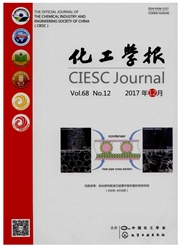

 中文摘要:
中文摘要:
考察了固定化酶常用载体-氨基树脂几何结构及表面活化过程对固定化核酸酶P1性能的影响,并进行了动力学和连续催化稳定性研究。FESEM、BET及FTIR等表征发现,氨基树脂具有大量酶可利用的孔,在固定化过程中核酸酶P1主要利用的孔径范围为4~30 nm。相对游离的核酸酶P1而言,所得固定酶耐酸、耐热性增强;米氏动力学研究表明各组固定酶对底物的亲和力下降,最大反应速率下降;后交联组的重复利用性相对物理吸附、化学交联组明显增强。优化的固定化条件为:酶和载体比例为3:20(质量比),酶浓度为0.8 g·L~(-1),酶液pH为6.0,固定时间为10 h,在优化条件下所得固定酶的单位载体酶活为10013 U·g~(-1)。同时设计及优化柱连续反应器操作条件,确定反应温度为65℃,进料流量为0.75 ml·min~(-1),使得产品的核苷酸浓度维持30 g·L~(-1)(水解率为60%)以上的累计时长达120 h,有利于核酸酶P_1连续生产核苷酸的工业化应用。
 英文摘要:
英文摘要:
The effect of HA amino resin(immobilized enzyme widely-used carrier) geometry and surface activated process on the immobilized nuclease P_1's properties was studied. In addition, the dynamic analysis and continuous catalytic properties were also investigated. FESEM, BET and FTIR characterization were utilized to verify that HA amino resin had a great deal of enzymes available hole and the scope of the main hole was 4—30 nm in the immobilized process. Compared with free nuclease P_1, the acid resistance and heat resistance of the immobilized enzymes were improved. The study on Michael's Mention kinetics indicated that the substrate affinity and maximum reaction rate of immobilized enzymes decreased; the reusability of after crosslinking group was significantly enhanced compared to physical adsorption and chemical crosslinking groups. The optimized conditions of immobilization were as follows: the enzyme to carrier ratio of 3:20(mass ratio), enzyme concentration of 0.8 g·L~(-1) and 10 h immobilized time at pH 6.0. Under these conditions, the immobilized enzyme activity was about 10013 U·g~(-1). Furthermore, the operating conditions of column flow reactor were designed and optimized. The continuous running time of the reactor was up to 120 h at 30 g·L~(-1) products nucleotide concentration(hydrolysis rate of 60%), when the reaction temperature was 65℃ with substrate flow rate of 0.75 ml·min~(-1). This work would be beneficial to the application of nuclease P_1 in nucleotide continuous industrial production.
 同期刊论文项目
同期刊论文项目
 同项目期刊论文
同项目期刊论文
 期刊信息
期刊信息
